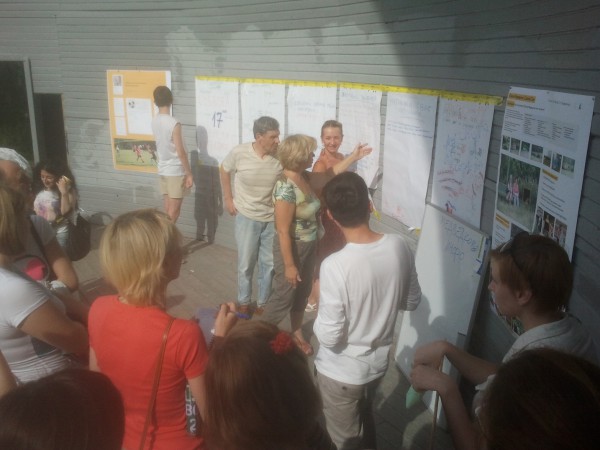On the morning of the sixth and final day the teams finalized their prototypes and presentation materials. In the afternoon we went from Strelka to the park in Yuzhnoye Medvedkovo. Unfortunately there had been a bit of miscommunication about the precise starting time of the event in the park. When we arrived at the amphitheater at around 15:00 the deputy of Uprava was already there, together with a small number of other interested people. She had understood 14:00 and she was not amused about our delay. Fortunately, she stayed and participated in the discussions during the presentations of the ideas and prototypes.
The workshop yielded quite a wealth of ideas and interventions, which I will describe here. As mentioned in the post about day 4, the two main problems that participants sought to address where:
1) lack of communication, and
2) lack of participation.
One of the prototypes consisted of a series of posters that say “I could be your babuschka [grandmother]“, or alternatively: “I could be your dog/nephew/neighbor” (coincidentally the adjacent neighborhood is called Babuschkinskaya). This idea was meant to provoke a sense of relationality between neighboring strangers who otherwise rarely speak to each other. Marc is posing with a life-sized grannie, that can be placed anywhere in the park to evoke playful reactions of passerby’s.
Another idea was to organize a kind of distributed curatorship for watching movies outdoor in the park at night. People themselves could program which films they want to show to their neighbors.
Somewhat along the same lines, another teams worked on an interface for organizing collaborative events. The interface assists people who wish to organize something in their neighborhood, like for example a football match, but do not really know how to either obtain necessary permissions from the local authorities and/or mobilize others.
Yet others came up with far more ‘tactical’ interventions, like a large stick-on salmon to cover up racist signs and slogans on a bridge over the Yauza river, and a template for Do-It-Yourself sign making that people can use to indicate what uses they see most fit for the park.
One of the observed problems in the park was that public furniture often gets vandalized. Benches and tables are often yanked from the ground and subsequently dragged around the park to other locations and damaged in the process. So why not allow people to decide themselves where to put the furniture? ChairShare is a proposal that allows people to borrow chairs and other furniture at a very low price point, and return the goods to get back their deposit.
Above and below some impressions of the actual event taking place on Saturday 14 July 2012 at the park in Yuzhnoye Medvedkovo.
All in all I think many interesting project proposals have been developed during the 6-day workshop, and the workshop participants deserve credit for their energy, creativity, team work and dedication. Clearly not all proposals are new media interventions. That was not the point of the workshop. Rather, the idea was to port the logics from online culture to the urban context. That, I believe, worked out pretty well. Of course there are things that did not go as well as hoped. Some summarizing points or lessons learned from this workshop are:
- No quick and easy solutions for complex problems
- Prototype early
- Iterate, iterate, iterate!
- Communication is key
- Building up trust with people is a slow process
- Who is going to continue with the project?
- Technology comes in late in the process!
Further reading
Read what one of the visitors has to say about the event on her blog (in Russian/English, with Google Translate).
There is also a Facebook group called COOP Cooperative urbanism, founded as part of the 2012 Strelka Summerschool ‘Agents of Change’.
The Next Web has a really interesting article about the rise of civic and social technologies for the common good in Russia:
The tech world in Russia can be more cynically viewed as predominantly commercial and filled with clones of services and products that never made it through the language barrier. But there are some fresh organisations working on changing this for the better and they’re not all making this happen within the Russian border.
The New York Times writes about the return of idealism and collectivism among young Russians:
A pervasive cynicism about communal action that took hold after the Soviet state and its professed collective ethos collapsed may be making way for a new sensibility — the idea that citizens can organize, be responsible for one another, and ultimately have an effect on how Russia governs itself.






























